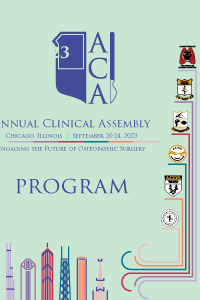General Surgery
Machine Learning for Predicting Outcomes After Hip Arthroscopy: A Systematic Review
Location: Grandball Room 1-2
- ML
Madison Lee
Rocky Vista University COM
Ivins, Utah, United States
Primary Presenter(s)
Introduction/Purpose: Machine learning (ML) and artificial intelligence (AI) are increasingly used in predicting outcomes of surgical interventions. Multiple studies have shown hip arthroscopy to grow as a method to treat femoroacetabular impingement and labral tears with increasing success and refinement. The ability to predict postoperative outcomes in elective hip arthroscopies remains a growing field. The purpose of this study is three- fold: (1) systematically assess the utility of ML models to predict outcomes, complications and resource utilization after hip arthroscopy; (2) compare the efficacy of ML models to conventional statistical methods; and (3) critically appraise the relevant literature.
Methods or Case Description: The PubMed, EMBASE, and Cochrane Central Register of Controlled Trials databases were scanned for article that included (1) texts available in English; (2) articles presenting original data; (3) articles reporting on ML models in the hip arthroscopy to predict patient-reported outcomes (PROs), complications and resource utilization; and (4) articles reporting on achievement of the MCID, patient acceptable symptomatic state (PASS), or substantial clinical benefit (SCB).
Outcomes: Twenty-one articles met the inclusion criteria. All studies used ML to predict outcomes of hip arthroscopies. Expected results include the majority of articles including subject patient meausres. The majority of studies used ML to predict MCID achievement. One article implemented a total monetary cost to the patient. Statistics and most common variable analysis is currently being assessed.
Conclusion: Currently available ML algorithms focus on patient-reported outcomes which increases subjectivity of predictions. However, such algorithms continue to augment shared decision-making practices between physician and patient. Additionally, prediction algorithms allow healthcare providers to provide more appropriate patient expectations using credible predctive tools. Although these ML algorithms are based widely on subjective patient outcomes, the field of ML is promising to guide both clinician and patient in surgical decisions.
Methods or Case Description: The PubMed, EMBASE, and Cochrane Central Register of Controlled Trials databases were scanned for article that included (1) texts available in English; (2) articles presenting original data; (3) articles reporting on ML models in the hip arthroscopy to predict patient-reported outcomes (PROs), complications and resource utilization; and (4) articles reporting on achievement of the MCID, patient acceptable symptomatic state (PASS), or substantial clinical benefit (SCB).
Outcomes: Twenty-one articles met the inclusion criteria. All studies used ML to predict outcomes of hip arthroscopies. Expected results include the majority of articles including subject patient meausres. The majority of studies used ML to predict MCID achievement. One article implemented a total monetary cost to the patient. Statistics and most common variable analysis is currently being assessed.
Conclusion: Currently available ML algorithms focus on patient-reported outcomes which increases subjectivity of predictions. However, such algorithms continue to augment shared decision-making practices between physician and patient. Additionally, prediction algorithms allow healthcare providers to provide more appropriate patient expectations using credible predctive tools. Although these ML algorithms are based widely on subjective patient outcomes, the field of ML is promising to guide both clinician and patient in surgical decisions.

